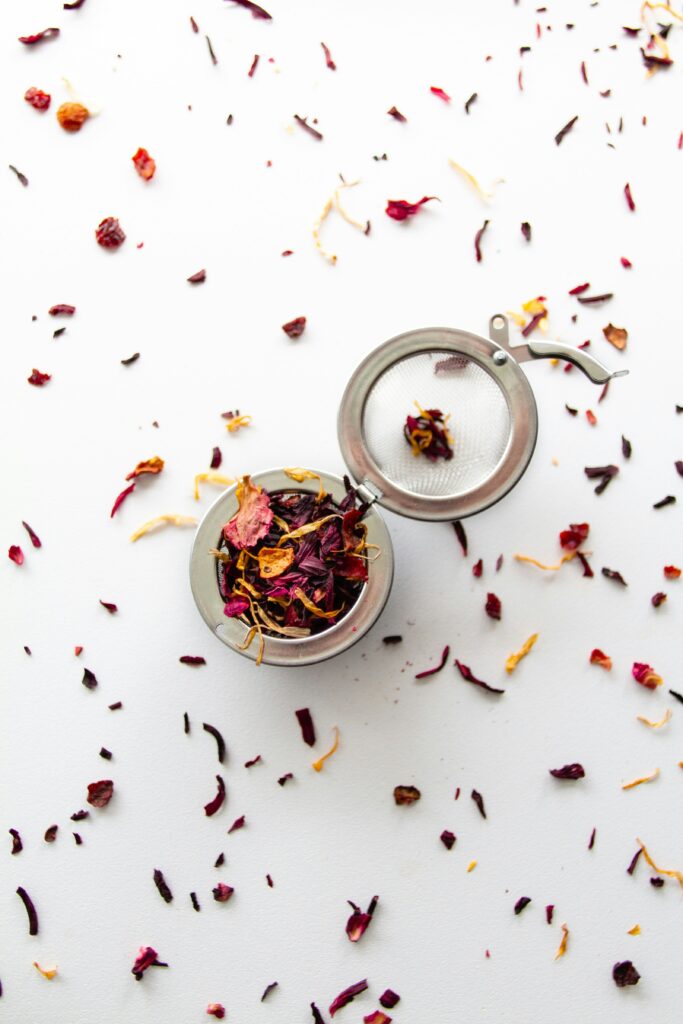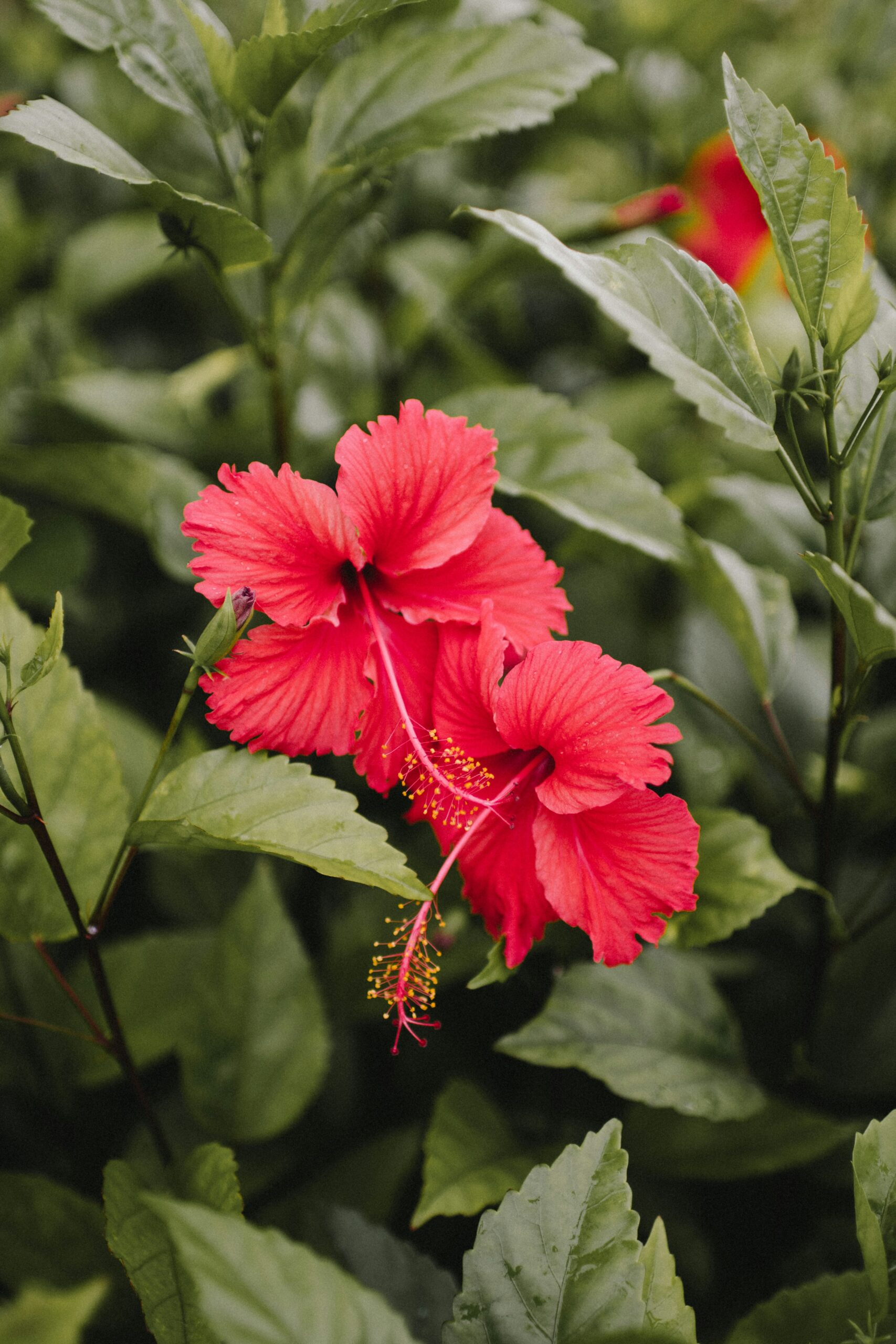Hibiscus, known for its vibrant petals and tart flavor, has long been revered in herbalism for its impressive health benefits. But what exactly is hibiscus used for, and how can you incorporate it into your daily wellness routine? Whether you’re an herbalist looking to deepen your knowledge or someone curious about natural remedies, this guide breaks down the key uses of hibiscus in herbalism, how to use it, and why it’s worth having this powerful flower on your wellness shelf.
What is Hibiscus?
Hibiscus is a genus of flowering plants in the mallow family, Malvaceae, and is found in tropical and subtropical regions around the world. The most commonly used species in herbalism is Hibiscus sabdariffa, also known as roselle. This species produces large, beautiful red flowers that are not only visually striking but packed with medicinal properties.
The flower petals are harvested, dried, and used in teas, extracts, and supplements, prized for their high levels of antioxidants, particularly vitamin C and anthocyanins. These compounds are the reason behind its vivid color and tart flavor, but they also contribute to hibiscus’s impressive health benefits.
Why Hibiscus is a Staple in Herbalism
Herbalists have used hibiscus for centuries to support overall health, reduce inflammation, improve cardiovascular wellness, and even enhance skin health. Its versatility and potency make it a favorite for those seeking natural remedies that offer both preventive and therapeutic benefits. But let’s dive deeper into how this vibrant flower works.
The Health Benefits of Hibiscus Flower
Hibiscus is much more than a pretty flower—it’s a botanical powerhouse with multiple uses in traditional and modern herbal medicine. Below are the primary benefits of hibiscus and how you can incorporate it into your wellness regimen.
1. Supports Cardiovascular Health
Hibiscus is well-known for its ability to support heart health. Research has shown that hibiscus can help lower blood pressure, which is why it’s often recommended for people with hypertension. It works by relaxing the blood vessels and allowing blood to flow more freely, thus lowering blood pressure and reducing strain on the heart.
- How to Use: Drink hibiscus tea daily to help maintain healthy blood pressure levels. Steep 1-2 teaspoons of dried hibiscus flowers in boiling water for 5-10 minutes, strain, and enjoy.
2. Promotes Weight Loss
If you’re looking for a natural way to aid in weight management, hibiscus could be a helpful ally. Some studies suggest that hibiscus extract can reduce the absorption of carbohydrates and fats in the body, which may assist with weight loss and metabolic health.
- How to Use: Incorporate hibiscus tea or supplements into your daily routine, especially after meals, to support healthy digestion and metabolism.
3. High in Antioxidants
Hibiscus is rich in powerful antioxidants like anthocyanins and vitamin C, which help combat free radicals in the body. This antioxidant activity is crucial for preventing oxidative stress, which can lead to chronic diseases like cancer and diabetes.
- How to Use: Enjoy hibiscus tea or add powdered hibiscus to smoothies or other drinks to boost your antioxidant intake naturally.
4. Supports Immune Health
Thanks to its high vitamin C content, hibiscus is an excellent immune booster. Vitamin C helps strengthen the immune system by promoting the production of white blood cells, which are key to fighting off infections.
- How to Use: Drink hibiscus tea or take hibiscus supplements regularly to support your immune health, especially during cold and flu season.
5. Promotes Skin Health
Hibiscus has natural anti-inflammatory and astringent properties, making it a great addition to any skincare routine. Its high vitamin C content promotes collagen production, while its natural acids gently exfoliate the skin, giving it a radiant glow.
- How to Use: Make a simple hibiscus face mask by mixing powdered hibiscus with a bit of honey or yogurt. Apply to your face for 10-15 minutes, then rinse for refreshed, glowing skin.
How to Use Hibiscus in Your Daily Life
There are many ways to incorporate hibiscus into your wellness routine. Whether you enjoy a warm cup of tea or use it topically for glowing skin, hibiscus is a versatile and accessible herb for natural health enthusiasts.
1. Hibiscus Tea
Perhaps the most common way to enjoy the benefits of hibiscus is through tea. Hibiscus tea is tart, slightly sweet, and packed with antioxidants. It’s also caffeine-free, making it an excellent choice for those looking for a refreshing yet calming drink.
- How to Brew Hibiscus Tea:
- Boil water and pour over 1-2 teaspoons of dried hibiscus flowers.
- Let steep for 5-10 minutes.
- Strain, and enjoy hot or cold.
- You can sweeten with honey or add a squeeze of lemon for an extra boost of vitamin C.

2. Hibiscus Extracts and Supplements
If you’re looking for a more concentrated form of hibiscus, consider using extracts or supplements. These are available in liquid, capsule, or powder forms and can be easily added to your daily routine for a quick, convenient dose of hibiscus’s powerful compounds.
- Tip: Always follow dosage instructions on the packaging or consult with a healthcare professional, especially if you are on medication for blood pressure or other health conditions.
3. Skincare with Hibiscus
Hibiscus can also be used topically in skincare. Its anti-inflammatory and astringent properties make it ideal for treating minor skin issues like acne or redness. You can find hibiscus-infused oils, creams, and face masks that are excellent for rejuvenating tired or inflamed skin.
- DIY Hibiscus Face Mask:
- Mix 1 teaspoon of powdered hibiscus with 1 tablespoon of yogurt or honey.
- Apply to clean skin and leave on for 10-15 minutes.
- Rinse with warm water and pat dry.
4. Cooking with Hibiscus
Hibiscus isn’t just for teas and skincare—it can also be a delicious addition to your kitchen. Dried hibiscus flowers are often used in traditional dishes, especially in Caribbean, African, and Mexican cuisines. You can use it to make sauces, jams, or even as a tangy flavoring for baked goods.
- Hibiscus Syrup: Steep hibiscus flowers in hot water, add sugar, and reduce the mixture to a syrup. This can be used to flavor cocktails, desserts, or even salad dressings.
Where to Find Quality Hibiscus
If you’re ready to incorporate hibiscus into your wellness routine, it’s important to source high-quality, organic, dried hibiscus flowers or supplements. Look for suppliers offering pure, sustainably sourced hibiscus to ensure you get the best quality product without fillers or additives.
You can find hibiscus flowers, teas, and supplements at our online shop or stop by our store to pick up some dried hibiscus and chat with us about how to use it! We take pride in offering only the best organic hibiscus, so you can trust that you’re getting a product that will truly benefit your health.
How to Store Hibiscus
Once you’ve purchased your hibiscus, it’s essential to store it correctly to maintain its potency. Dried hibiscus flowers should be kept in an airtight container, away from heat, light, and moisture. When stored properly, hibiscus can retain its potency for up to two years.
- Tip: Store your hibiscus in a cool, dark pantry and check for any signs of mold or discoloration before use.
Frequently Asked Questions
1. What are the main health benefits of hibiscus?
Hibiscus offers a range of health benefits, including supporting cardiovascular health, aiding weight loss, boosting the immune system, and promoting skin health. It’s rich in antioxidants and can help lower blood pressure.
2. How much hibiscus tea should I drink daily?
While hibiscus tea is generally safe, it’s recommended to limit intake to 2-3 cups per day. If you have any underlying health conditions, particularly related to blood pressure, consult your healthcare provider.
3. Can I use hibiscus for skincare?
Yes! Hibiscus is great for the skin due to its natural acids, antioxidants, and anti-inflammatory properties. You can use hibiscus in face masks, oils, or serums to improve skin texture and radiance.
4. Are there any side effects of using hibiscus?
While hibiscus is generally safe for most people, it can cause blood pressure to drop, so it’s important to consult a doctor if you’re taking blood pressure medications or are pregnant.
5. Where can I buy quality hibiscus flowers or supplements?
You can purchase high-quality organic hibiscus flowers, teas, and supplements from our shop. Order online or visit us in-store to explore our range of herbal products.
Whether you’re sipping on a cup of tart hibiscus tea or adding it to your skincare routine, this versatile flower offers an abundance of health benefits. Be sure to stop by our shop or visit our online store to pick up your organic hibiscus flowers today!
Disclaimer: The products and information on this site are not evaluated by the FDA and are not intended to diagnose, treat, cure, or prevent any disease or illness. This content is for informational purposes only and should not replace professional medical advice. Always consult your healthcare provider regarding any concerns, especially if you are pregnant, nursing, have allergies, or are managing a health condition.
Nestled in the heart of Williston, ND, and born from a passion for holistic wellness, Purposeful Apothecary is more than just a store—it's a sanctuary for those seeking a more natural, harmonious way of living. Founded by Nikie and Antoine Wright, our journey began on Etsy, where we connected with like-minded individuals passionate about all-natural, sustainable health and wellness solutions.
Today, we're thrilled to welcome you to our physical haven in Williston, as well as our digital storefront, where every product tells a story of tradition, healing, and the power of nature.
Nikki and Antoine Wright
Founded by
Previous Post
Next Post
Keep Reading
blog home
SEARCH
What do you want to learn today?
trending searches
herbs
Wellness
featured
Remedies
Apothecary Essentials
Mindfulness

+ Show / Hide Comments
Share to: